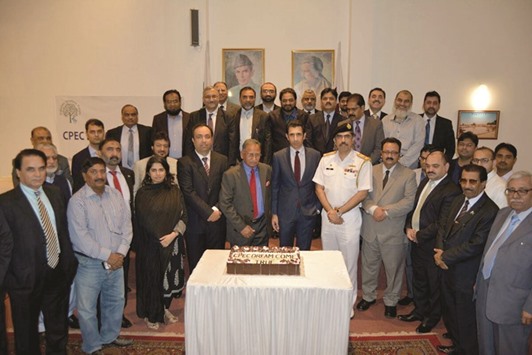As the first trade shipment via the China-Pakistan Economic Corridor (CPEC) was officially shipped from Pakistan’s Gwadar port recently, members of Pakistani expatriate and business community got together in Doha to celebrate the momentous occasion.
Organised by Pakistan Qatar Business Forum (PQBF), a local business community organisation comprising Pakistani and Qatari business firms, the ceremony, held at the auditorium of Pakistan embassy, witnessed participation from prominent businessmen and members of the expatriate community.
Ambassador of Pakistan Shahzad Ahmad, accompanied by other senior officers of the embassy, joined PQBF president Ahmed Hussain and members in a cake-cutting ceremony. Prime Minister of Pakistan Nawaz Sharif last week officially launched the first shipment from Gwadar port, kicking off trade activity at the harbour and across the multibillion-dollar road network under CPEC.
Addressing the audience at Pakistan embassy, Hussain said their organisation about three years ago envisaged that the trade route from China to Pakistan must be constructed and made on priority basis. “It has the potential to change the whole scenario in the region. A gamechanger, it would be an economic engine for Pakistan which will change the fate of future generations,” said Hussain.
“We had given our suggestions to the then prime minister-elect Nawaz Sharif on the improvement of business and economy in Pakistan. One of the main suggestions that PQBF gave to the prime minister-elect was the establishment of trade route between China and Pakistan,” added the PQBF president.
Though they did not give it a name at that time, it was the same trade route which was later called the CPEC when it indeed came into being, he added. Explaining the significance of CPEC, Hussain said it was not their brainchild, however, it was their dream. He lauded the efforts of the prime minister of Pakistan in keeping CPEC a priority for his government and executing the plan efficiently and quickly.
“It is a fast track programme and it materialised within two years. A land route is open and now operational. A convoy of trade goods has already arrived from China outbound for Middle East and Africa. It has already started and we are really happy about it,” Hussain told the audience, adding that the occasion was to be celebrated.
Speaking to media, the PQBF president said they strongly believe that in order to realise the dream of CPEC in its true spirit, they need to provide trained manpower.
It is people who deliver at the end of the day. They should be trained to provide services for the CPEC, which include logistics, warehousing, services and manufacturing.
“Bringing manpower from China would be three times as expensive and their safety and security will remain a concern. Therefore, we need to provide trained manpower especially in the manufacturing and services sectors,” said Hussain, adding that PQBF intends to play its part in opening vocational and technical training institutions all along the corridor in collaboration with provincial governments.
“We are already talking about it to the governments of Punjab and Sindh provinces. We are also travelling to Pakistan soon and will meet the Federal Minister of Planning Ahsan Iqbal. We would ask him to push with the government support so that we complete it quickly,” said Hussain.
CPEC is an estimated $46bn project that will effectively pitchfork Pakistan as a robust economic player in the region. CPEC is a corridor with several dozen interlinked and staggered projects that will run through Pakistan and culminate into China’s Xinjiang province.
The corridor itself has three routes; eastern, central and western, which as well as realigning Pakistan’s current road network, will lift the country’s economic profile thanks to the scheme’s premise in addressing the energy crunch.
Some 61% of the $46bn project will be spent on the energy sector to improve system capacity, transmission and distribution network. The other 39% will be used for infrastructure, transport and communication.
Launched last year with great fanfare by visiting Chinese President Xi Jinping, CPEC projects are benchmarked for the short-term (2020), mid-term (2025) and long-term (2030). Projects worth $18bn are currently in the implementation stage while portfolios of some $17bn are under preparation.
The rest of the $11bn is earmarked for the infrastructure of Gwadar Port, billed as the next hub of maritime trade in the region. Gwadar is ideally placed to fast track exports and imports to and from GCC countries, particularly UAE and Saudi Arabia as well as the region.

CHEERING CPEC: The get-together was attended by Pakistani Ambassador Shahzad Ahmad, PQBF members and prominent members of the expatriate community.
